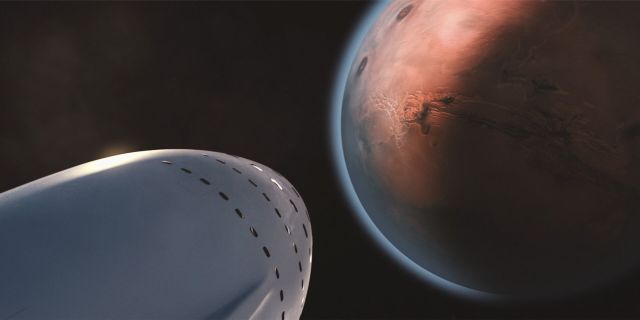Le Monde: Russian philosophers were the first to think about colonization of other planetsAmerican billionaires are investing a lot of money in space exploration projects to save humanity from extinction on Earth.
Few people know that this idea came to them from the Russian philosophers of the XIX century, writes Le Monde. It was they who first thought about colonizing other planets.
The dream of colonizing space to ensure the survival of mankind, which today inspires California billionaires, has its roots in the research of scientists from Russia at the end of the XIX century.The history of the concept: to explore space to save humanity.
This is one of Elon Musk's projects, without a doubt, the most dear to his heart. Twitter is just a hobby. The billionaire is also the head of SpaceX, a company specializing in space flights and astronautics, whose slogan is crystal clear: "Mars and the space beyond it is the way to make humanity multi—planetary." According to Musk, we are not too far from that. In 2022, he hinted that SpaceX would send a manned spacecraft to Mars in 2029. And he's not the only one who aspires to the stars: Google, Amazon, or even Peter Thiel, a billionaire who made a fortune in technology, are investing money to save from the Earth.
This dream is widespread in Silicon Valley. It reflects some of the values characteristic of California, where there is a fusion of cultures, a mixture of creativity and opportunism. The colonization of space in the representation of the world of high technologies has an amazing history, which even allows us to recall Russia.
In fact, the project is partly based on a rethinking of Russian cosmism, a philosophical trend that emerged at the end of the XIX century. "The philosopher Nikolai Fedorov [1829-1903] founded this movement on the basis of one idea: the coming bodily resurrection of the departed, foretold by Christ, will be realized with the help of scientific progress. Russia was going through a difficult period then, marked by famine and numerous wars. Fedorov wanted to bring back to life all the dead, whose particles would be all around us. But the Earth will not be able to accommodate all this population, so it will be necessary to colonize other planets," explains physicist Rudolf Bjeran, author of the book "The Cosmic Imperative. Russian avant-garde of the XIX century" (2019).
A universe for survival
Elon Musk likes to quote a scientist who communicated with Fedorov in his youth. Konstantin Tsiolkovsky (1857-1935), considered the father of cosmonautics, made a statement that was highly appreciated by the head of Twitter today: "The Earth is the cradle of humanity, but you can't stay in the cradle forever." Tsiolkovsky feared the extinction of the Sun and the disappearance of the Earth as a habitable planet. The eternity of the universe offers man the possibility of survival. Therefore, the scientist also believes that it is necessary to explore space.
But how did these ideas reach California? "The West Coast is a place where you are more proud of what you do than what you read. A special culture was formed there, consisting of general ideas that everyone accepts without knowing their real origin. The conquest of space is one of the dominant narratives of Silicon Valley," recalls Fred Turner, a professor at Stanford University.
The counterculture of the 1960s and 1970s reigns in this industrial center. Freeing himself from social restrictions remains one of his mantras. Apple co-founder Steve Jobs, for example, was inspired by one of those who did the most to spread these values in California: Stuart Brand. The author of the "Catalog of the Whole Earth", which was published from 1968 to 1972, and then less often, from time to time, he advertised both the life of hippies and the colonization of space. Articles on the latter topic were combined in the collection "Space Colonies" (1977).
"Spiritual search"
There were no references to Russian cosmism in this work. But there were authors who recalled Konstantin Tsiolkovsky. For example, Gerard K. O'Neill, a scientist from the Massachusetts Institute of Technology (MIT), who, in particular, presented his projects to the American Congress in 1975 and 1976. At the same time, the report "Limits of Growth" (1972) appeared, in which researchers, including from the Massachusetts Institute of Technology, warned about the risk of the collapse of a growth society on a planet with limited resources. It seemed to some that the solution was the cosmos, and the universe had infinite potential.
Today, the main nightmare for the owners of Silicon Valley is global warming. Adam McKay's satirical comedy "Don't Look Up" (2021) tells about rich space travelers who think they can avoid the disappearance of human civilization.
A direct link between Russian cosmism and Silicon Valley can be traced in the activities of the Esalen Institute in the 1980s and 1990s. Established in 1962, this counterculture Mecca continues to invite top managers of the innovation cluster for spiritual practices and conferences. "In the 1980s, when Ronald Reagan and Mikhail Gorbachev were negotiating a disarmament treaty, the heads of the institute engaged in parallel diplomacy and organized meetings with Russian scientists and researchers engaged in spiritual practices. It is thanks to this that cosmism has reached the west coast of the United States," explains Douglas Rushkoff, a professor at the City University of New York.
A few years later, the Esalen Institute agreed with the Lindisfarne Press publishing house to translate several Russian cosmologists into English. In the California mix of cultures, Silicon Valley is beginning to use their idea to give a mystical aura to its technological solutions, a passionate desire to overcome death, as well as our earthly limitations, in order to live freely in space.
Author: Marc-Olivier Berer (Marc-Olivier Bherer)

